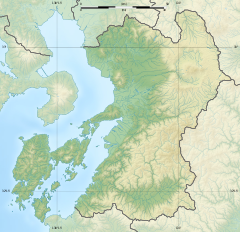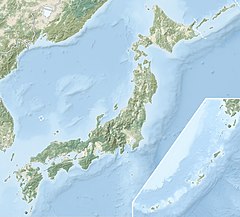Uto Domain (宇土藩, Uto-han) was a Japanese domain of the Edo period. It was regarded as a sub-domain of Kumamoto Domain. It was based at the Uto jin'ya in what is now the city of Uto, Kumamoto. It was ruled by a cadet branch of the tozama daimyō Hosokawa clan for all of its history.[1][2][3]
| Uto Domain 宇土藩 | |||||||||
|---|---|---|---|---|---|---|---|---|---|
| Domain of Japan | |||||||||
| 1646–1870 | |||||||||
Mon of the Hosokawa clan
| |||||||||
| Capital | Uto jin'ya | ||||||||
| Area | |||||||||
| • Coordinates | 32°41′03.83″N 130°39′41.49″E / 32.6843972°N 130.6615250°E | ||||||||
| • Type | Daimyō | ||||||||
| Historical era | Edo period | ||||||||
• Established | 1646 | ||||||||
• Disestablished | 1870 | ||||||||
| |||||||||
| Today part of | Kumamoto Prefecture | ||||||||
Location of Uto Jin'ya | |||||||||

History
editThe domain was headed by a cadet branch of the Hosokawa clan of Kumamoto.[4] In 1624, the second daimyō of Kumamoto Domain, Hosokawa Mitsunao set aside estates in Uto District and Shimomashiki District in Higo Province with a kokudaka of 30,000 koku for his cousin, Hosokawa Yukitaka, and authorized him to establish a cadet branch of the Hosokawa clan.[5] This was done partly as "insurance" to ensure the survival of the parent domain in the event that succession of the main lineage fail. The headquarters for this new domain was near the ruins of Uto Castle, but as a subsidiary domain, Hosokawa Yukitaka was not authorized to rebuild the castle, but instead constructed a jin'ya as his stronghold and administrative center. The domain survived for 11 generations until it was merged back into Kumamoto Domain in 1870 and then abolished with the Meiji restoration. #[6]
# Name Tenure Courtesy title Court Rank kokudaka Hosokawa clan, 1646 - 1870 (Tozama daimyo) 1 Hosokawa Yukitaka (細川幸隆) 1646 - 1690 Tango-no-kami (丹後守) Junior 5th Rank, Lower Grade (従五位下) 30,000 koku 2 Hosokawa Arikata (細川有孝) 1690 - 1703 Izumi-no-kami (和泉守) Junior 5th Rank, Lower Grade (従五位下) 30,000 koku 3 Hosokawa Okinori (細川興生) 1703 - 1735 Izu-no-kami / Yamashiro-no-kami (伊豆守、山城守) Junior 5th Rank, Lower Grade (従五位下) 30,000 koku 4 Hosokawa Okisato (細川興里) 1735 - 1745 Yamato-no-kami (大和守) Junior 5th Rank, Lower Grade (従五位下) 30,000 koku 5 Hosokawa Okinori]] (細川興文) 1745 - 1772 Nakatsukasa-no-shosuke (中務少輔) Junior 5th Rank, Lower Grade (従五位下) 30,000 koku 6 Hosokawa Narishige (細川斉茲) 1772 - 1787 Izumi-no-kami / Etchu-no-kami (和泉守、越中守) Junior 4th Rank, Lower Grade (従四位下) 30,000 koku 7 Hosokawa Tatsuyuki (細川立之) 1787 - 1818 Izumi no kami (和泉守) Junior 5th Rank, Lower Grade (従五位下) 30,000 koku 8 Hosokawa Narimori (細川斉護) 1818 - 1826 Etchu-no-kami / Sakon'e-no-chujo (越中守、左近衛権中将、侍従) Junior 4th Rank, Lower Grade (従五位下) 30,000 koku 9 Hosokawa Yukika (細川行芬) 1826 - 1851 Buzen-no-kami / Saemon-no-jo (豊前守、 左衛門尉) Junior 5th Rank, Lower Grade (従五位下) 30,000 koku 10 Hosokawa Tatsunori (細川立則) 1851 - 1862 Yamashiro-no-kami (山城守) Junior 5th Rank, Lower Grade (従五位下) 30,000 koku 11 Hosokawa Yukizane (細川行真) 1862 - 1870 Yamato-no-kami / Buzen-no-kami (大和守、豊前守) Junior 5th Rank, Lower Grade (従五位下) 30,000 koku
See also
editReferences
edit- ^ Nakayama, Yoshiaki (2015). 江戸三百藩大全 全藩藩主変遷表付. Kosaido Publishing. ISBN 978-4331802946.(in Japanese)
- ^ Nigi, Kenichi (2004). 藩と城下町の事典―国別. Tokyodo Printing. ISBN 978-4490106510.
- ^ Papinot, E (1910). Historical and Geographic Dictionary of Japan. Tuttle (reprint) 1972.
- ^ Rein, Johannes Justus. (1884). Japan: Travels and Researches Undertaken at the Cost of the Prussian Government, p. 524.
- ^ 細川行孝 at Nihon jinmei daijiten; 細川行孝 at Reichsarchiv.jp; retrieved 2013-5-30.
- ^ 細川立禮 at Nihon jinmei daijiten; retrieved 2013-5-30.
- ^ Papinot, Jacques Edmond Joseph. (1906). Dictionnaire d'histoire et de géographie du Japon; Papinot, (2003). "Hosokawa" at Nobiliare du Japon, p. 12; retrieved 2013-5-28.
External links
edit- "Uto" at Edo 300 (in Japanese)
- Uto City Digital Museum (in Japanese)


